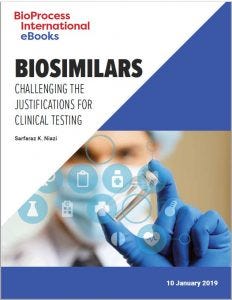Biosimilars: Challenging the Justifications for Clinical TestingBiosimilars: Challenging the Justifications for Clinical Testing
January 31, 2019
 The Biologics Price Competition and Innovation Act (BPIA) of 2009, describes the need for clinical trials as follows (1): “(cc) a clinical study or studies (including the assessment of immunogenicity and pharmacokinetics or pharmacodynamics) that are sufficient to demonstrate safety, purity, and potency in one or more appropriate conditions of use for which the reference product is licensed and intended to be used and for which licensure is sought for the biological product.”
The Biologics Price Competition and Innovation Act (BPIA) of 2009, describes the need for clinical trials as follows (1): “(cc) a clinical study or studies (including the assessment of immunogenicity and pharmacokinetics or pharmacodynamics) that are sufficient to demonstrate safety, purity, and potency in one or more appropriate conditions of use for which the reference product is licensed and intended to be used and for which licensure is sought for the biological product.”
However, all the above studies are left to the discretion of the US Food and Drug Administration (FDA). Other requirements not left to the agency’s discretion include the same drug, the same dosage form, a US-licensed comparator, the same indication, the same mode of action (MoA), and current good manufacturing practice (CGMP) compliance.
A review of the 16 biosimilar products thus far approved by the FDA shows that all those products’ developers conducted at least one pharmacokinetic (PK) and/or pharmacodynamic (PD) study in healthy subjects or patients, at least one immunogenicity testing in humans, and at least one additional clinical efficacy study to demonstrate biosimilarity (4). Herein I question the rationale for each type of clinical study conducted and offer an alternative testing strategy to shorten the period of biosimilar development. Both the European Medicines Agency (EMA) and the FDA agree that additional clinical studies should be unnecessary (8, 9).
In developing its guidance for developers, the FDA clearly states what clinical studies are required for establishing biosimilarity (2). The “Types of Clinical Data” box is excerpted from a presentation, “Overview of the Regulatory Framework and FDA’s Guidance for the Development and Approval of Biosimilar and Interchangeable Products in the US,” by Leah Christl (director of the therapeutic biologics and biosimilars staff at the FDA’s Center for Drug Evaluation and Research (CDER) and Sue Lim (director of the scientific staff in CDER’s Therapeutic Biologics and Biosimilars Staff (TBBS) (2).
Just fill out the form below to download this eBook now.
You May Also Like





